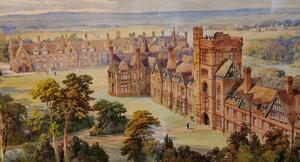Women’s education activist and suffragist Louisa Goldsmid is born
Women’s education activist and suffragist Louisa Goldsmid was born in Sussex, England, on September 1, 1819. She was the daughter of Moses Asher Goldsmid and his first wife Eliza, as well as the niece of Isaac Lyon Goldsmid, one of the leading figures of Jewish emancipation in the United Kingdom.
In 1839, Goldsmid married her first cousin, Francis Henry Goldsmid, who later became the first Jewish barrister in England. The couple had no children, and Goldsmid dedicated her life to women’s causes, continuing her family’s tradition of political activism. Goldsmid’s mother-in-law, Anna Maria Goldmid, had been involved with Jewish education and a member of the Langham Place circle, an informal association of middle-class women collaborating on women’s issues. When Louisa joined this network of philanthropic and activist women, she devoted herself to working towards women’s admission into university examinations.
Goldsmid’s efforts played a significant part in the 1869 creation of Girton College, Cambridge, the first residential college for women in the United Kingdom. Her educational activism was not limited to women or to the university level; she was a member of the Ladies’ Committee of the Infants’ School for the Jewish Poor, founded by her family.
In 1867, Goldsmid turned her attention to women’s suffrage, participating in the first Women’s Suffrage Committee in London. She sparred with John Stuart Mill, the Member of Parliament who submitted the first women’s suffrage petition to Parliament in 1866; believing that a petition that included married women was strategically disadvantageous, she argued that the petition should limit its demands to unmarried women and widows. When Mill and his supporters held firm, Goldsmid retreated from the suffrage movement to focus on middle-class education. She later re-entered the movement, becoming an executive committee member of the National Society for Women’s Suffrage and working with prominent suffragist Millicent Garret Fawcett to protest legislation that excluded women from working in the chain manufacturing industry.
Mill was not the only prominent figure with whom Goldsmid disagreed publicly. When the popular Anglo-Jewish Jewish Chronicle refused to cover pogroms in the Russian Empire, Goldsmid’s criticism was key to its eventual change of policy and decision speak against the pogroms.
Goldsmid inherited her initial focus, education, from her mother-in-law and utilized her family’s networks and foundations to accomplish much of her work. However, the breadth of issues she tackled, as well as the ease and success with which she disputed prominent—often male—figures in those networks, made Goldsmid’s work distinctive.
Sources:
Alderman, Geoffrey. “Goldsmid, Louisa Sophia, Lady Goldsmid (1819-1908), feminist and promoter of women’s education.” Oxford Dictionary of National Biography. Oxford: Oxford University Press, 2018.
Monaco, C. S. The Rise of Modern Jewish Politics: Extraordinary Movement. Routledge Studies in Religion; 25. New York: Routledge, 2013.



